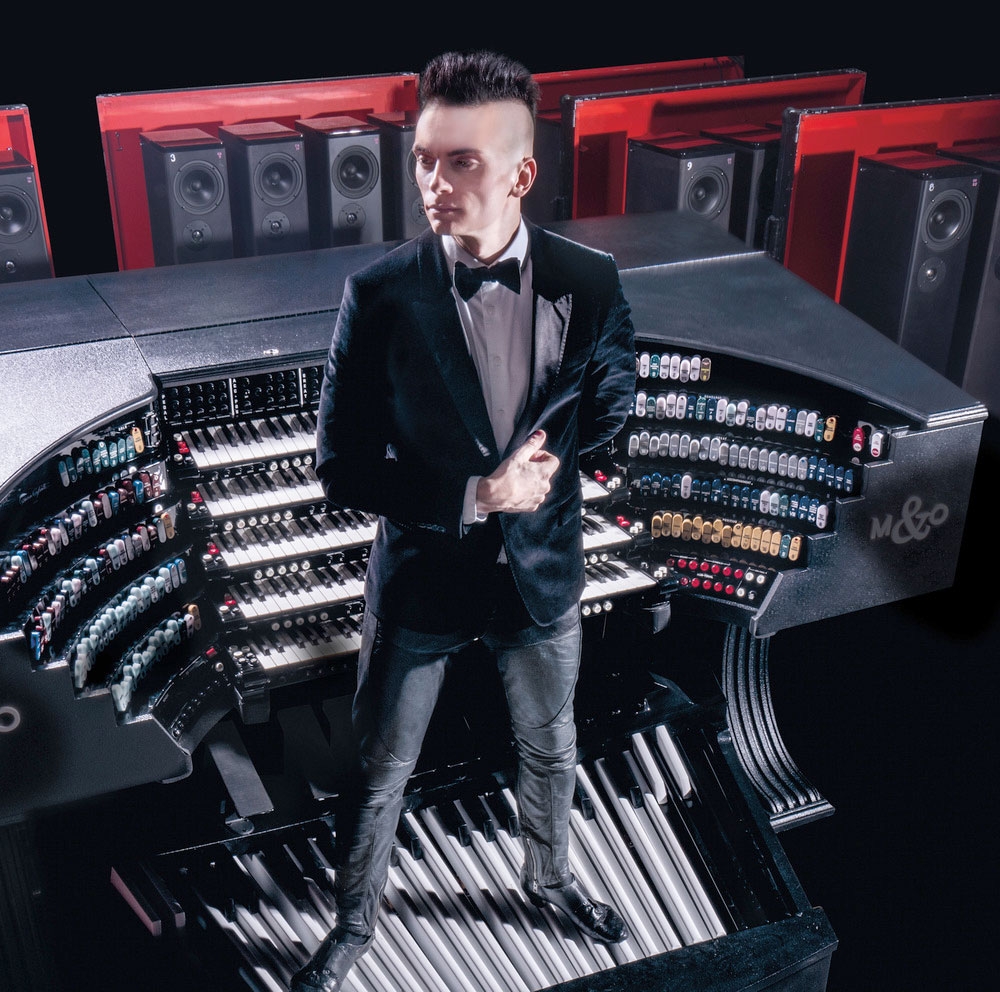The word “spectacle” often follows Cameron Carpenter. Even when considering the sequined shoes, a $1.3 million traveling digital organ (that he designed himself) and his intellectual bravado, Carpenter insists those syllables should be rearranged to “skeptical” when referencing his work and persona.
The Juilliard-trained and Grammy-nominated musician has uprooted the organ from its fusty reputation and has consistently annoyed purists with his unorthodox interpretations of standard repertoire. Ahead of his performance with the Kalamazoo Symphony Orchestra this month, Revue talked with Carpenter to unpack the stereotypes associated with his field.
The organist might be the only musician without an instrument to call their own. What have been the benefits of having your own portable, digital organ?
From the beginning, the organ has faced all kinds of infrastructural challenges and implications that other instruments do not. Honestly, it’s absurd to think that organists have ever been satisfied with the situation. Any way that I’m able to change that, it should be changed.
How should it be changed?
I think the digital future of the organ is writ large in the history of the instrument itself, and was gradually defined by the implications of emerging technologies throughout different eras. In fact, it was the most complex man-made machine until the late 19th century. Keeping all that in mind, my instrument allows me to play for more people in more places. It also allows me to prove, test, develop and promote my ideas as an organ theorist, which I think in the long term will be my bigger contribution, assuming I make any contribution in the world at all!
That’s fascinating, because the usual perception is that the organ is a very traditional, church-bound instrument. Perhaps the opposite is true?
Yes, and you should never be told that the organ comes from Christianity. The organ in its 2,300-year-old history actually precedes and predates Christianity in extremely tangible form. It’s an extreme irony that the organ is portrayed as having a soul or being derived from faith, because for hundreds of years it was the most sophisticated machine most people would ever encounter.
Your latest recording features mostly works by Bach, and one by The Beatles.
Yeah, unfortunately. I was kind of twisted into that. One of my old mentors had a joke that if I ever made a Bach album I could call it “All You Need is Bach.” That’s exactly what I did. Then some record executive suggested I do a cover of “All You Need is Love.” I think that’s the last time I’ll ever listen to a record executive.
Why’s that?
Because I hate The Beatles. I hate that song and I wish it weren’t on the record. In a way, it’s kind of good, because if you listen to that track you can hear how much I despise it. I go out of my way to make it sound terrible and like a ridiculous, out-of-shape theater organ — which is about as much as that dreadful and ideologically-bankrupt song deserves. I do try to make statements in music. I think that’s important.
There’s so much room for interpretation with Bach’s organ music. Is that what inspired the theme of this record?
That’s exactly right. One of the great strengths of Bach’s music is that it’s constructed in such a way that nothing is lost in transmission. The organ music is free of registrations, but it also happens to be free of things like phrasing and dynamics, which are staples of all other music. It’s almost as though the basic essence of the musical information itself — pitch, time and rhythm — is enough. That’s why Bach’s organ works can be played by a saxophone quartet or an accordion and still make complete sense.
Is your work out of concern for the future of your instrument and classical music in general?
No, not at all. It’s a very fortunate thing for me that I come from a non-musical family. It’s served me well, because it’s allowed me to be sensitive to people who don’t understand classical music at a deep level. In some ways, it’s more difficult and interesting to please that person. There’s so much material that they can listen to subjectively without trying to pass judgment on it, as opposed to a listener who is really educated and has to take the entire performance at face value. Ultimately, the decisions that I make have nothing to do with the future of classical music. The future of classical music is not my responsibility, and it’s not the responsibility of any one person.
Cameron Carpenter
Miller Auditorium
2200 Auditorium Dr., Kalamazoo
April 1, 8 p.m., $12-$60
kalamazoosymphony.com, (269) 349-7759





